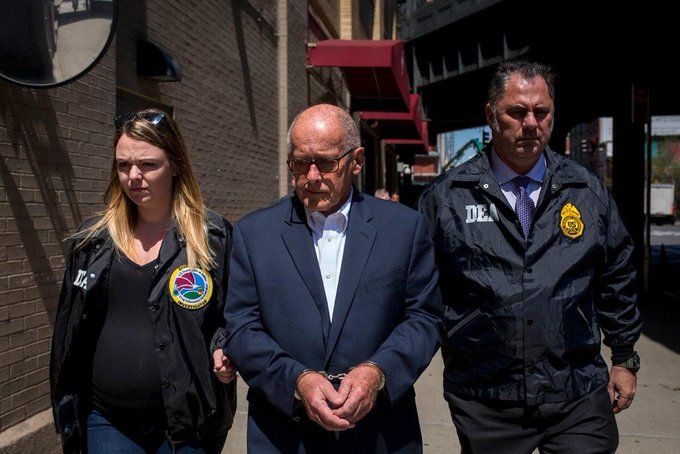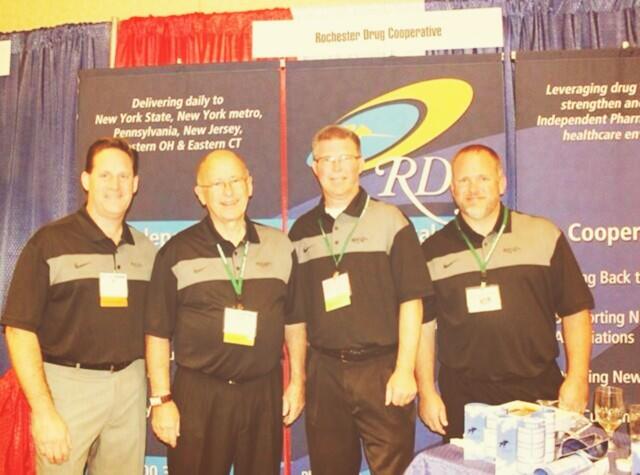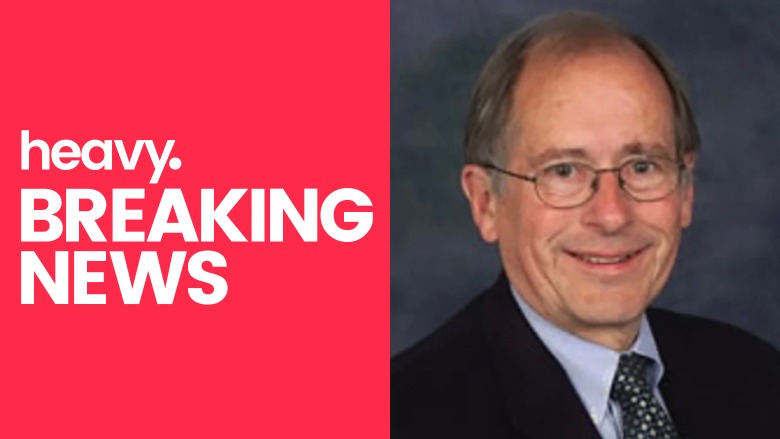
Laurence Doud III is the former CEO of Rochester Drug Cooperative and the first executive of a major drug distribution company to face federal criminal charges in connection to the ongoing opioid crisis. Doud was hit with criminal charges accusing him unlawfully distributing oxycodone and fentanyl and conspiring to defraud the DEA, the Manhattan U.S. Attorney’s Office announced April 23.
Doud was charged with conspiracy to distribute controlled substances and conspiracy to defraud the United States, U.S. Attorney for the Southern District of New York Geoffrey Berman said in a press release. Doud now faces up to life in prison if convicted.
Federal prosecutors also announced charges against Doud’s former company, Rochester Drug Cooperative, also known as RDC, and another former executive, William Pietruszewski, who was the company’s chief compliance officer. RDC entered a consent decree admitting wrongdoing and agreeing to pay a $20 million fine and institute changes within the company. Pietruszewski pleaded guilty to conspiracy to distribute controlled substances, conspiracy to defraud the United States and willfully failing to file suspicious order reports with the DEA. He is cooperating with the investigation.
According to the U.S. Attorney’s Office, RDC, “is a wholesale distributor of pharmaceutical products, including controlled substances, headquartered in Rochester, New York. It is one of the nation’s 10 largest distributors of pharmaceutical products – and the fourth largest in the New York area – with over 1,300 pharmacy customers and over $1 billion in revenue per year.”
As The New York Times points out, the drug conspiracy charge against Doud is the same type of charge typically used by federal prosecutors against street-level dealers and pill-pushers.
“Law enforcement officials have long tried to stem the opioid crisis in America with criminal charges for street dealers and cartel kingpins who traffic in drugs like fentanyl and oxycodone,” The Times writes. “The government’s novel tactic was expected to reverberate through the pharmaceutical industry, where large corporations and senior executives have long escaped criminal culpability for the epidemic of overdoses from prescription painkillers, like oxycodone.”
RDC said in a statement, “We made mistakes. And RDC understands that these mistakes, directed by former management, have serious consequences.” The company and its executives have been investigated by the DEA for more than two years that began after the company violated the terms of a civil settlement “The company had admitted in the civil case that it had for years failed to report thousands of suspicious opioid orders from pharmacies, many of which flouted order limits and catered to doctors who ran pill mills,” The Times reported.
Doud, 75, sued RDC last year, according to the Rochester Democrat & Chronicle, claiming he was wrongfully fired and was set up by other executives to take the fall. Doud claims in the lawsuit that the other executives conspired against him. “”Mr. Doud is being framed by others to cover up their wrongdoing,” his attorney, Robert Gottlieb, told The Times. “The government has it all wrong. He will fight these charges to his last breath and he will be vindicated.”
Here’s what you need to know about Laurence Doud:
1. Doud ‘Cared More About Profits Than Laws Intended to Protect Human Life,’ the Manhattan U.S. Attorney Says
Laurence Doud III is accused of distributing “dangerous highly addictive opioids to pharmacy customers,” while knowing they were “being sold and used illicitly,” according to court documents. Prosecutors said under Doud’s leadership, “RDC supplied tens of millions of oxycodone, fentanyl and other dangerous opioids to pharmacy customers that its own compliance personnel determine, and reported to Doud, were dispensing those drugs to individuals who had no legitimate medical need for them. Doud directed the company to supply pharmacies he knew were dispensing controlled substances in contravention of the Controlled Substances Act, in order to maximize the company’s revenue and Doud’s compensation.”
Manhattan U.S. Attorney Geoffrey Berman said at a press conference, “Our country is in midst of a persecution drug abuse epidemic. Our office will do everything in its power to bring to justice anyone responsible for unlawfully fueling this epidemic, and that includes executives who illegally distribute drugs from their boardrooms.”
Berman said Doud and his company were motivated by “greed.” He added that Doud, “cared more about profits than laws intended to protect human life.”
According to prosecutors:
From 2012 through March 2017, as alleged, RDC knowingly and intentionally violated the federal narcotics laws by distributing dangerous, highly addictive opioids to pharmacy customers that it knew were being sold and used illicitly. At the direction of its senior management, including Doud and Pietruszewski, RDC supplied large quantities of oxycodone, fentanyl, and other dangerous opioids to pharmacy customers that its own compliance personnel determined were dispensing those drugs to individuals who had no legitimate medical need for them. RDC distributed controlled substances to those pharmacies even after identifying “red flags” of diversion, including dispensing highly abused controlled substances in large quantities; dispensing primarily controlled substances; dispensing quantities of controlled substances in amounts consistently higher than accepted medical standards; accepting a high percentage of cash for controlled substance prescriptions; dispensing to out-of-state patients; and filling controlled substances prescriptions issued by practitioners acting outside the scope of their medical practice, under investigation by law enforcement, or on RDC’s “watch list.” In addition, and at Doud’s direction, RDC frequently brought on pharmacy customers that had been terminated by other distributors.
RDC’s employees, including in conversations with Doud and Pietruszewski, described some of the company’s customers as “very suspicious,” and even characterized particular pharmacies as a “DEA investigation in the making” or “like a stick of dynamite waiting for [the] DEA to light the fuse.” Nonetheless, throughout the period in question, RDC, at the direction of Doud, increased its sales of oxycodone and fentanyl exponentially. From 2012 to 2016, RDC’s sales of oxycodone tablets grew from 4.7 million to 42.2 million – an increase of approximately 800 percent – and during the same period RDC’s fentanyl sales grew from approximately 63,000 dosages in 2012 to over 1.3 million in 2016 – an increase of approximately 2,000 percent. During that same time period, Doud’s compensation increased by over 125 percent, growing to over $1.5 million in 2016.
Prosecutors added:
From 2012 through March 2017, as alleged, RDC took steps to conceal its illicit distribution of controlled substances from the DEA and other law enforcement authorities. Among other things, RDC made the deliberate decision not to investigate, monitor, or report to the DEA pharmacy customers that it knew were diverting controlled substances for illegitimate use. Because it knew that reporting these pharmacies would likely result in the DEA investigating and shutting down its customers, RDC’s senior management, including Doud, directed the company’s compliance department – and in particular Pietruszewski – not to report them, and instead to continue supplying those customers with dangerous controlled substances that the company knew were being dispensed and used for illicit purposes. Among other things, pursuant to Doud’s instructions, and contrary to the company’s representations to the DEA, RDC opened new customer accounts without conducting due diligence, and supplied those customers – some of whom had been terminated by other distributors – with dangerous controlled substances.
Additionally, RDC knowingly and willfully avoided filing suspicious order reports with the DEA as required by law. Between 2012 through 2016, the company identified approximately 8,300 potentially suspicious “orders of interest,” including thousands of oxycodone orders, but the company reported only four suspicious orders to the DEA. As alleged, RDC did not report suspicious orders in order to protect the profit being generated by customers dispensing large quantities of controlled substances. As a result, the DEA’s ability to identify and prevent the illicit dispensing of highly addictive controlled substances by several of RDC’s pharmacy customers was impeded.
You can read the full indictment against Doud below:
2. RDC Announced Doud’s ‘Retirement’ in an April 2017 Newsletter, Saying He’d Worked for the Drug Company for 30 Years
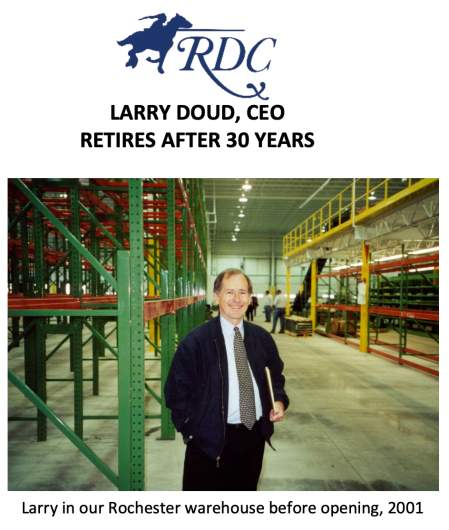
Larry Doud.
Laurence Doud retired as CEO of Rochester Drug Collective in April 2017 after 30 years with the company. He became CEO in 1991. After his retirement, he remained on board as a consultant and board member, but was fired in 2018, according to the Rochester Democrat & Chronicle.
According to an RDC newsletter, Doud began working at the company in 1987 as a sales manager after working for 22 years at two unnamed competitors.
“At RDC, he immediately hired sales representatives and opened new markets in Buffalo, Syracuse and the Southern Tier of New York,” according to the newsletter. “He introduced hard-hitting programs designed to take business from competitors such as the famous ‘Feather Plucker’ special.”
The company praised Doud for growing the company’s stock value and increasing profits.
“Overall, Larry instituted a strategy of aggressive sales growth supported by a solid management team and a
consuming vision to make RDC the Knight In Shining Armor for Independent Pharmacy,” the newsletter said. “The strategy paid off with RDC rising from one of the lowest ranked wholesalers to 7th largest in the nation and servicing stores in 7 states from 2 warehouses. His impression on the corporate culture and numerous employees will never be forgotten.”
The newsletter explains the “vision” that Doud brought to RDC:
In 1987, when Larry first came to RDC, he brought a passionate dream and a unique skillset to create a “boutique” wholesaler that could strictly cater to Independent Pharmacy. Long overlooked by the marketplace, Independents were a class of trade providing true personal healthcare, and specializing in disease states that other pharmacies could not.
But they needed help with group purchasing power, political advocacy, and starting up new stores. Rochester Drug Cooperative was the perfect place for Larry to make his dream come true. Larry shared his vision with the staff and hired new employees to reinvigorate the company. Together, they built RDC into what it is today. Thanks to the incredible response and loyalty of RDC’s Customers, Stockholders, Board of Directors, Vendors, and legal team, RDC has risen from a ranking far below #200 to #7 in the nation.
Larry’s vision has lasted for 30 years. It will be carried on long after his term. RDC has succeeded and flourished in the face of high competitive pressure, as has Independent Pharmacy – two great partners undergirding the US Healthcare system.
3. Doud Lives With His Wife in New Smyrna, Florida
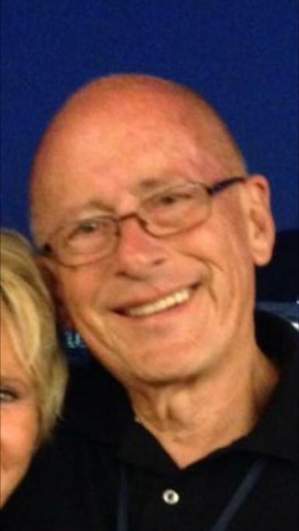
FacebookLarry Doud.
Larry Doud, a former New York resident, has been living in New Smyrna, Florida, since retiring as CEO of RDC. He lives with his wife, Carol Doud. He is a father, with two daughters and a son, and also has several grandchildren.
During his years at RDC, Doud received several awards and recognition from the pharmaceutical industry, including from the Albany College of Pharmacy. Doud was involved in setting up a relationship between his company and the school that led to a student-run pharmacy.
“Most students interested in the business of pharmacy have to learn it through on-the-job training that occurs after they graduate,” Larry Doud said in a 2016 statement. “Through this effort, ACPHS students will be able to participate in an innovative and entrepreneurial experience while still in school, learning both advanced pharmacy practices and the business skills required to operate a successful pharmacy.”
Doud was given an honorary degree by the Albany College of Pharmacy in 2016.
“After decades of consolidation, most industry observers in the 1980’s believed that independent pharmacy would not survive. Larry Doud was not one of those people. Since he joined Rochester Drug Cooperative (RDC) in 1987, RDC has become one of the nation’s largest drug wholesalers, serving community pharmacies and home health care dealers (and by extension, patients) in eight states,” the college’s president, Greg Dewey, said in an announcement about the honorary degree. “During that time, RDC has helped launch and maintain more than 400 independent pharmacies – including the College’s own student operated pharmacies. Since the early 2000’s, the number of independent pharmacies has remained relatively stable, in part due to the efforts of people like Larry who understand that independent pharmacists remain an important part of the nation’s health care system.”
According to the RDC newsletter, Doud enjoys hunting with his son and grandchildren and has performed with the “Funky Knights Blues Band.”
4. Legal Experts Say Federal Authorities Could Be Using Doud as a ‘Test Case’ for Prosecuting Drug Company Executives in Connection to the Opioid Crisis
Legal experts told The New York Times that the prosecution of Laurence Doud and RDC could be a “test case” for federal prosecutors seeking to hold drug companies and executives responsible for the opioid crisis.
“This prosecution is the first of its kind: executives of a pharmaceutical distributor and the distributor itself have been charged with drug trafficking, trafficking the same drugs that are fueling the opioid epidemic that is ravaging this country,” Manhattan U.S Attorney Geoffrey Berman said in a statement. “Our Office will do everything in its power to combat this epidemic, from street-level dealers to the executives who illegally distribute drugs from their boardrooms.”
DEA Special Agent in Charge Ray Donovan added, “Today’s charges should send shock waves throughout the pharmaceutical industry reminding them of their role as gatekeepers of prescription medication. The distribution of life-saving medication is paramount to public health; similarly, so is identifying rogue members of the pharmaceutical and medical fields whose diversion contributes to the record-breaking drug overdoses in America.”
Donovan continued, “DEA investigates DEA Registrants who divert controlled pharmaceutical medication into the wrong hands for the wrong reason. This historic investigation unveiled a criminal element of denial in RDC’s compliance practices, and holds them accountable for their egregious non-compliance according to the law.”
At a press conference on April 23, Berman used Doud’s own RDC slogan against him, telling reporters that RDC, “routinely prioritized sales over compliance,” and was, “the knight in shining armor for pharmacies that had been cut off by other distributors.”
5. Doud Was Scheduled to Appear in Federal Court on Tuesday & Faces Up to Life in Prison if Convicted of the Drug Conspiracy Charge
Laurence Doud was scheduled to appear in federal court in Manhattan on Tuesday after surrendering to Drug Enforcement Administration agents in New York. Doud faces several years in federal prison if convicted of the charges against him.
The conspiracy to distribute controlled substances charge carries up to life in prison and a mandatory minimum of 10 years behind bars. Conspiracy to defraud the United States carries a maximum prison term of five years, according to prosecutors.
“The maximum potential sentences are prescribed by Congress and are provided here for informational purposes only, as any sentencing of the defendants will be determined by the judge,” the U.S. Attorney’s office said in a press release.
U.S. Attorney Geoffrey Berman, “praised the investigative work of the DEA’s Westchester Tactical Diversion Team, comprising Special Agents, Diversion Investigators, and Task Force Officers from the DEA, Westchester County Police Department, Town of Orangetown Police Department, Rockland County Sheriff’s Office, Woodbury Police Department, Yonkers Police Department, New Windsor Police Department, and Putnam County Sheriff’s Office.”
His office added, “The criminal cases are being handled by the Narcotics Unit of the Office’s Criminal Division. Assistant U.S. Attorneys Stephanie Lake, Louis Pellegrino, Nicolas Roos, and Alexandra Rothman are in charge of the prosecutions. The civil case against RDC is being handled by the Office’s Civil Division. Assistant U.S. Attorneys Jacob M. Bergman and Jeffrey K. Powell are in charge of the case.”
READ NEXT: Professor Planned to Set Fire at St. Patrick’s Cathedral: Cops
